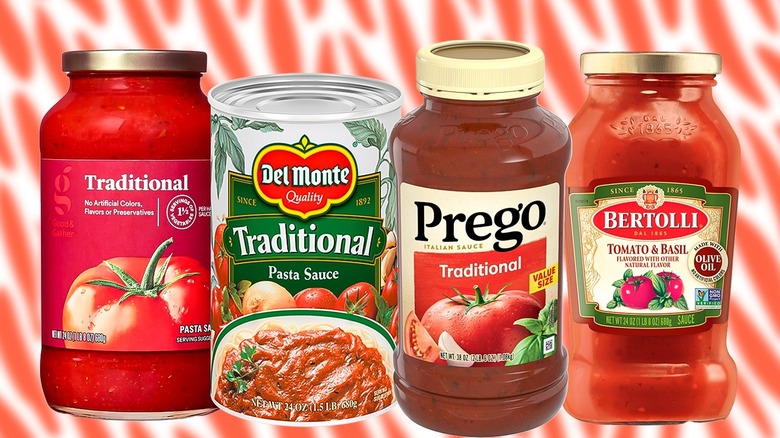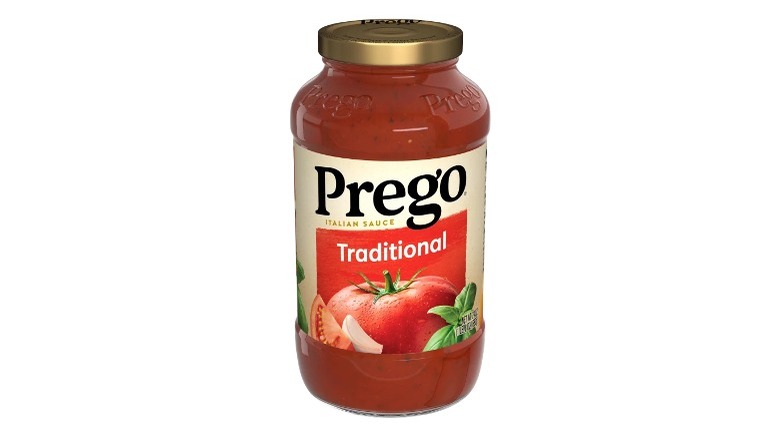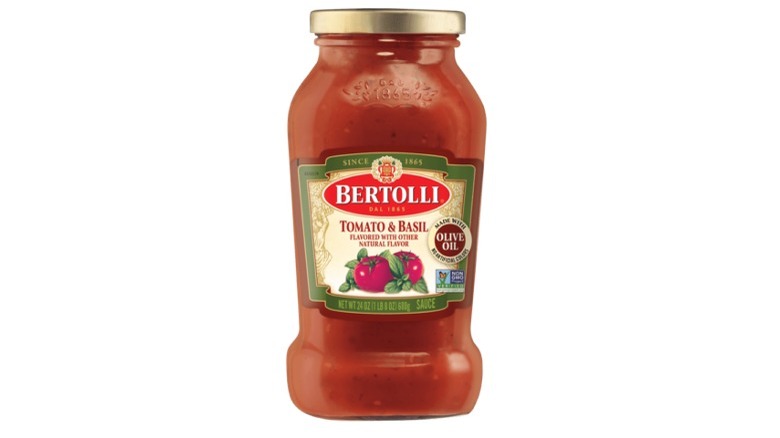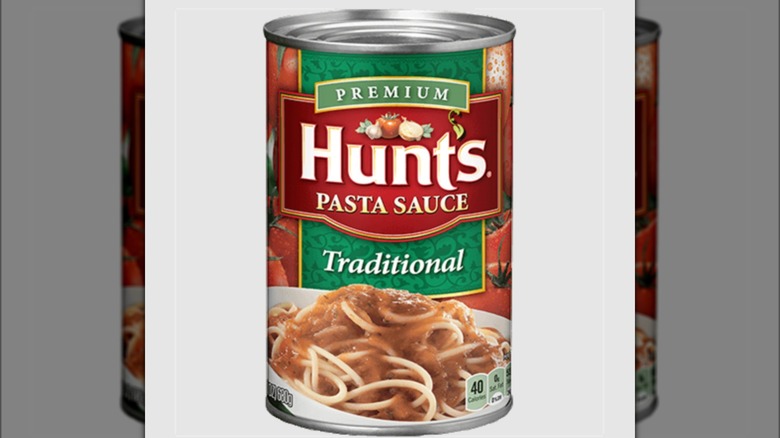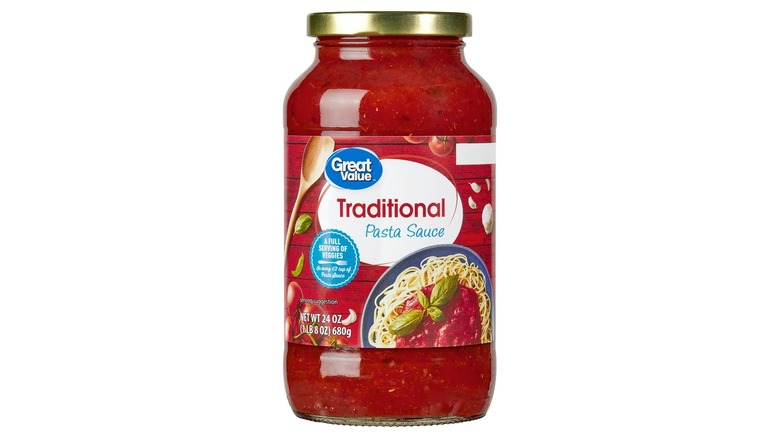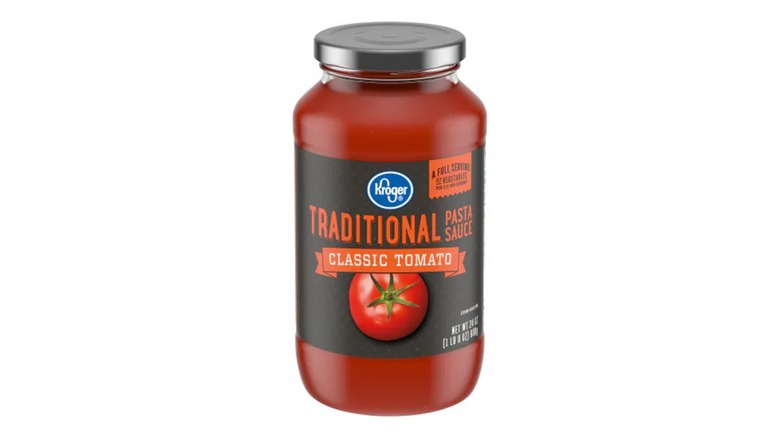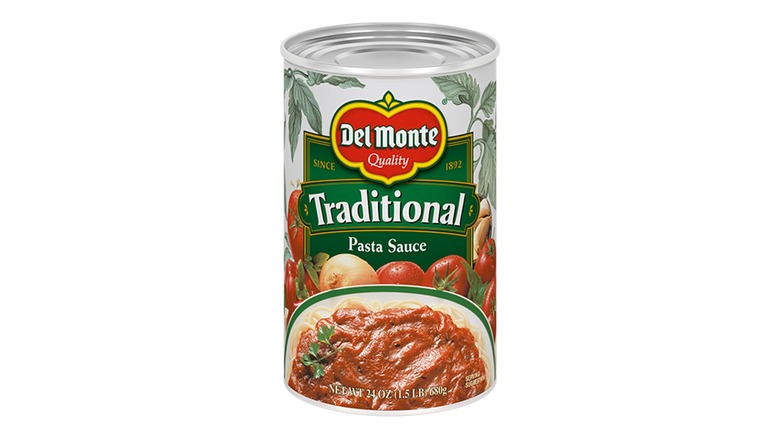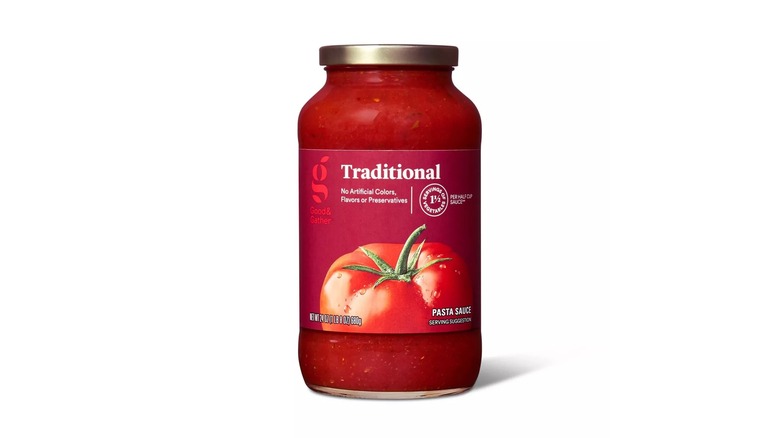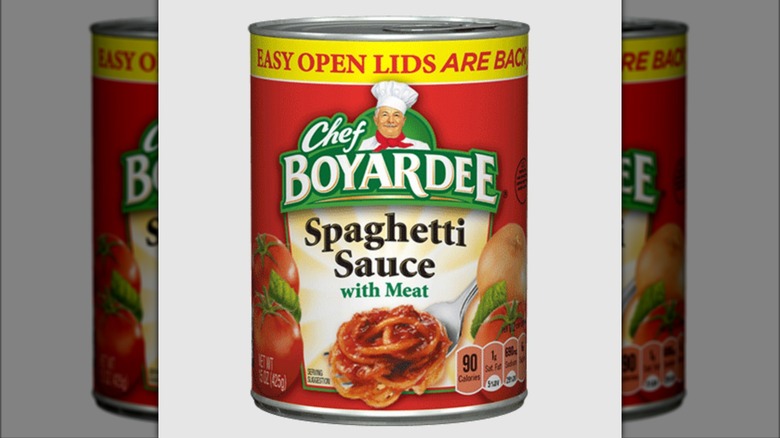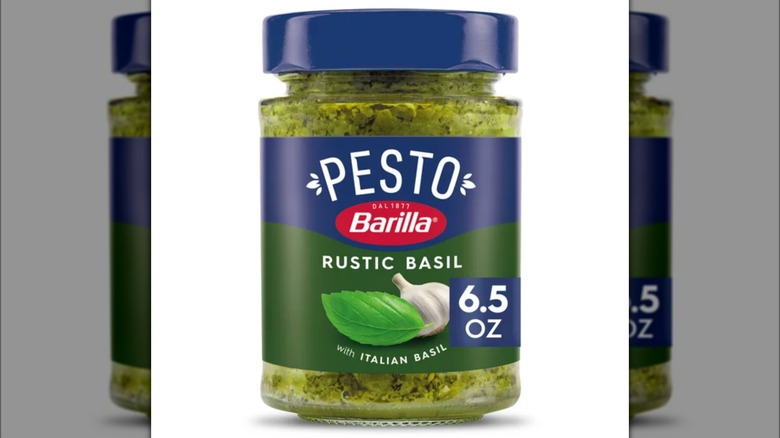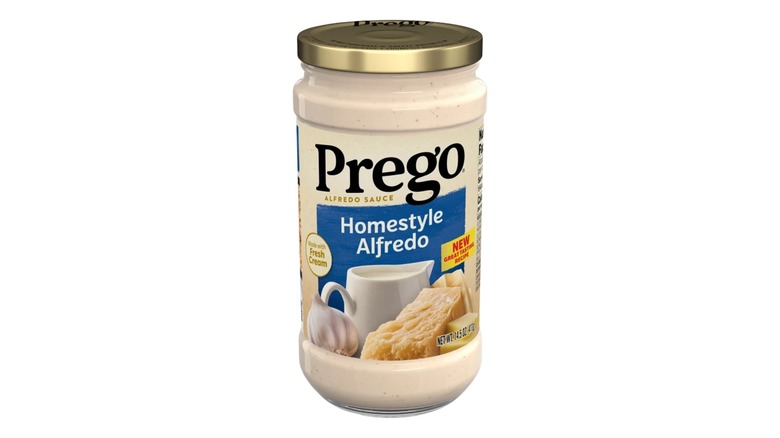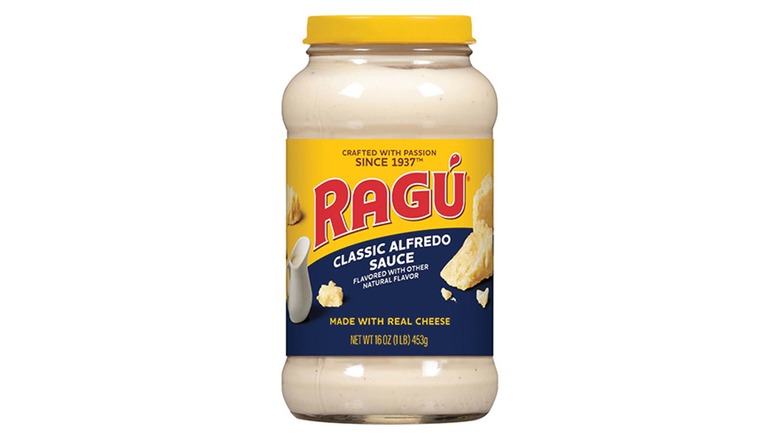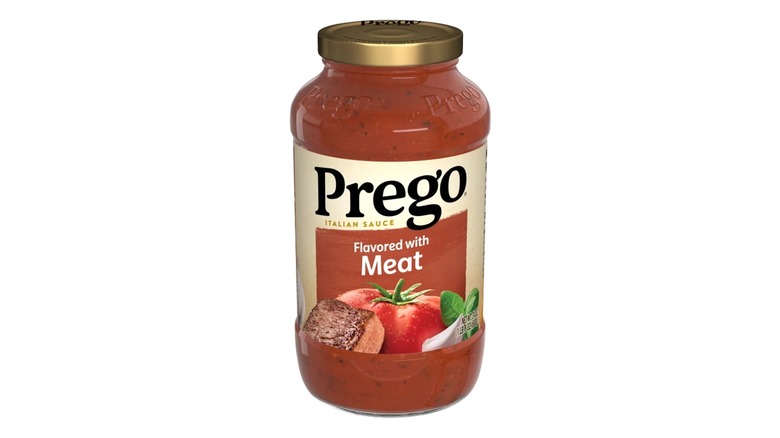Pasta Sauces That Are Made With The Lowest Quality Ingredients
We may receive a commission on purchases made from links.
When it comes to convenience foods, pasta is a delicious, filling, and cost-effective meal for families of all sizes. However, making homemade pasta sauce can be a labor of love (not to mention time and money), making jarred pasta sauces a stand out pantry staple in many households. With a jar of sauce and a bag of pasta on hand, all you need is some added veggies or protein to make a complete, quick, and easy meal for busy weeknights.
However, convenience oflten comes at a cost, either through taste or the quality of ingredients used to make the product. As it turns out, not all jarred sauces are created equal. While some boast rich, authentic flavors and are made with high-quality ingredients, others fall short, relying on cheaper, less nutritious components that may compromise both the taste of the sauce and its health benefits.
To clear up any confusion you may encounter when searching the pasta sauce aisle, we've compiled a list of brands of sauces made with the lowest quality ingredients. By highlighting the common culprits that can turn a promising sauce into a disappointing meal and understanding what to watch out for when it comes to ingredients, you can make better choices for both your palate and your health.
Prego Traditional Italian Sauce
Prego is a familiar sight in grocery store aisles. However, familiarity doesn't guarantee quality, as is evident in the brand's Traditional Italian Sauce. This product has some of the common pitfalls of lower-quality pasta sauces, like added sugars. When used in moderation, additional sugar can help balance the natural acidity of tomatoes. However, Prego's addition of four grams of added sugar significantly increases the sugar content to nine grams total and contributing empty calories.
Additionally, Prego uses canola oil, a choice likely driven by a desire for cost-effectiveness rather than flavor or quality. Canola oil lacks the distinctive taste and health benefits associated with extra virgin olive oil, a traditional ingredient in homemade pasta sauces that is rich in antioxidants and healthy essential fatty acids. The use of canola oil, in contrast, contributes a more neutral taste and lacks the unique depth that olive oil offers. So, although Prego Traditional Italian Sauce might be convenient, affordable, and widely available, its added sugars and use of canola oil makes it a less desirable choice for those seeking a high-quality pasta sauce.
Bertolli Tomato & Basil Sauce
Bertolli is another popular brand of mass-produced, jarred pasta sauces. It's tomato and basil sauce, while aiming to capture the essence of authentic Italian cuisine, falls short due to the inclusion of a few lower-quality ingredients. For one, the brand uses tomatoes that have been treated with calcium chloride. Although this additive is commonly used to maintain the firmness of tomatoes during processing, it can impart a metallic aftertaste that some consumers don't like. As tomatoes are arguably the most important ingredient in the sauce, it's essential that their quality and flavor is up to par.
Bertolli's packaging label states the brand uses added sugar in its sauce. Sugar is not an uncommon ingredient, even in homemade sauces. However, its presence in larger quantities (11 grams total in a serving of this variety) can negatively effect the sauce's nutritional profile in addition to overpowering the taste of the tomatoes and basil. These ingredients suggest Bertolli's focus is on creating a shelf-stable, cost-effective product rather than delivering something that highlights the natural flavors of its ingredients.
Hunt's Traditional Pasta Sauce
Hunt's Traditional Pasta Sauce, despite its widespread availability and affordability, has several ingredients that are often associated with lower-quality jarred sauces. A significant concern is the use of high-fructose corn syrup, a cheap sweetener that, to many people's estimations, adds unnecessary sugars and calories. This ingredient isn't necessarily better or worse for you than table sugar, which is often used to balance acidity in tomato-based sauces. However, the fact that high-fructose corn syrup is cheaper than sugar means that it can be used in higher quantities. In Hunt's Traditional Pasta Sauce, there are six grams of sugar total. This can result in an overly sweet sauce that strays from more balanced traditional Italian flavors.
Hunt's also uses tomato puree as a primary ingredient, which can indicate the use of lower-quality tomatoes. That's because tomato puree is oftentimes made from reconstituted tomato paste, which may lack the vibrant flavor and texture of fresh, whole tomatoes. These factors combined make Hunt's Traditional Pasta Sauce a less appealing choice for those who are seeking an authentic and nutritious pasta sauce.
Great Value Traditional Pasta Sauce
Walmart is known for having low prices on many grocery products, particularly with its in-house brand, Great Value. The store's take on pasta sauce is a budget-friendly option, but it also has several ingredients common in lower-quality pasta sauces that you may wish to avoid, potentially landing it alongside some of the other unhealthiest foods from the Great Value brand. As with many sauces on our list, one of the primary issues here is the addition of sugar. Great Value's Traditional Pasta Sauce contains three grams of added sugar (that's 6% your daily recommended value), contributing to a total of 10 grams of sugar per half-cup serving. Generally, added sugar should be avoided wherever possible for those seeking a health-conscious lifestyle.
Another factor landing Great Value on our list is that the sauce is primarily made with tomato puree as opposed to whole tomatoes. This can result in a less fresh flavor experience. Additionally, Walmart's in-house brand of pasta sauce uses soybean oil. This oil, while economical, does not offer the same flavor punch or health benefits of other higher-quality alternatives, like olive oil. This choice of ingredients reflects cost-cutting measures that, while they help consumers save money, ultimately compromises the taste and health benefits of the sauce.
Kroger Classic Tomato Traditional Pasta Sauce
Kroger's Classic Tomato Traditional Pasta Sauce is another convenient and readily-available option that, unfortunately, utilizes several subpar ingredients. For starters, the sauce primarily uses tomato puree, rather than whole tomatoes, suggesting it's made with lower-quality tomatoes and a less fresh flavor compared to sauces made with whole tomatoes. As is the case with many of the brands on this list, the sauce also contains added sugar. The result is increased calorie and sugar content (10 grams of sugar in just half a cup) and potentially added sweetness that takes away from the expected flavor of an authentic Italian tomato sauce.
Another significant concern with Kroger's take on pasta sauce is its use of soybean oil. Soybean oil is a cost-effective ingredient with neutral flavor and a rather unimpressive nutritional profile. Paired with the other ingredients mentioned, suggests the brand is concerned with cost-savings as opposed to producing the highest quality product it can. For discerning pasta lovers, Kroger Classic Tomato Traditional Pasta Sauce is less than appealing.
Del Monte Traditional Pasta Sauce
Del Monte Traditional Pasta Sauce, which is typically sold for just under a few dollars per can, is understandably a popular choice for many budget conscious shoppers. However, like many wallet-friendly products, the sauce contains ingredients that suggest a lower quality product. Firstly, there is the use of high-fructose corn syrup, a common ingredient in low-quality products due to its affordability and ability to impact flavor. Despite its economical nature, high-fructose corn syrup adds extra sugar and calories to the sauce, with a total of 8 grams of sugar in a half-cup serving (4 grams of which are added sugars).
Soybean oil is another ingredient commonly used in low-quality sauces and Del Monte is no different. It's clear by these ingredient choices that Del Monte Traditional Pasta Sauce is aiming to offer a less expensive product as opposed to an extremely high quality one. However, while consumers may appreciate the savings, this brand may fall short for those seeking a more authentic and nutritious pasta sauce experience.
Good & Gather Traditional Pasta Sauce
Good & Gather Traditional Pasta Sauce is a part of Target's in-house brand of grocery products, some of which have garnered quite a lot of praise. At only a couple of dollars for 24 ounces of sauce, this product is a steal for those shoppers who are working with tight budgets. The brand also gets some points for eschewing artificial colors, flavors, or preservatives. However, there are a few ingredients on the list that may raise concerns for quality-concerned consumers. That's in part because Good & Gather's sauce contains added sugar, something many health-conscious shoppers should be on the lookout for in any processed product.
Meanwhile, the precise oil used in the sauce is vague. The ingredients label indicates vegetable oil, but then reads "cottonseed oil and/or canola oil and/or soybean oil." This lack of specificity can be a significant drawback for consumers who are particular about the types of oil used in their food. The ambiguity suggests that the sauce could contain any of these oils, each potentially varying widely in flavor, nutritional profile, and quality. If it's unrefined, cottonseed oil, is one of the less desirable options of the three, due to its high saturated fat content and potential for containing a toxin known as gossypol (refined cottonseed oil used in cooking does not contain this, however, as per Healthline). Canola and soybean oils, while more common, still are not as flavorful as the more traditional extra virgin olive oil.
Chef Boyardee Spaghetti Sauce with Meat
Chef Boyardee Spaghetti Sauce with Meat may be a nostalgic choice for many. However, the childhood brand we all remember unfortunately uses several lower-quality ingredients, including high-fructose corn syrup, which can offer additional sugars and calories with little nutritional value. Additionally, the sauce does not specify the quality of the meat used. The packaging simply states "beef" as an ingredient. This may be a concern for consumers who prioritize humane practices and high quality of their meat products. The lack of transparency regarding the meat's origin and grade suggests the use of lower-quality or highly processed meat, which can affect both the flavor and nutritional value of the sauce.
Rather surprisingly, carrots are listed as an ingredient here, suggesting the amount of meat used in the sauce is low compared to other, higher-quality or homemade sauces. In other words, the carrots could be an additional filler product meant to bulk up the sauce. Although this product could be great for moments of nostalgia, it may be worth skipping if ingredient quality is your primary concern.
Barilla Traditional Basil Pesto Sauce
While it aims to offer a convenient take on a classic Italian pasta sauce, Barilla Traditional Basil Pesto Sauce is missing some of the high-quality ingredients typically associated with homemade pesto. Traditional pesto is made primarily with olive oil, which is loved in Italian cooking for its rich flavor and beneficial, heart-healthy fats. However, Barilla's version uses sunflower oil, a less-expensive alternative that does not provide the same health benefits. Perhaps most disappointing of all, the rich, authentic flavor that olive oil gives to pesto sauces is missing here.
Another concern over this variety of sauce is the inclusion of the hard-to-define "natural basil flavor." This ingredient seems unnecessary if fresh basil is already a primary ingredient; according to the sauce's ingredient label, it is. The use of such flavorings suggests that the actual basil content or quality may be lower than expected, with Barilla relying on additional enhancements to achieve its desired taste. For consumers seeking a delicious and healthy pesto sauce, Barilla's use of sunflower oil and arguably vague flavorings makes it a less appealing option. Perhaps a homemade basil pesto is worth the extra time after all.
Prego Homestyle Alfredo Sauce
While Prego Homestyle Alfredo Sauce is marketed as a comforting and convenient option for an Italian dinner, there are several ingredients that make the sauce less than ideal compared to other brands. One of the most pressing issues is the lack of specification regarding the type and quality of parmesan cheese used. This is especially concerning for an alfredo sauce, which typically requires a lot of the Italian-style cheese to create its signature flavor and consistency. True DOP Parmigiano-Reggiano, the highest quality Parmesan, requires specialty labeling that confirms the product is from where the brand claims it is. The quality of DOP cheese means it is more expensive than lower-quality varieties, yet it also offers a distinct and rich flavor. The absence of a DOP label suggests a lower-quality cheese is used in Prego's alfredo, which is perhaps unsurprising given its price but nevertheless doesn't say much in favor of its quality.
Additionally, the sauce contains modified food starch. While this ingredient is generally considered safe to consume, modified food starch is often used as a thickening agent and has little to no nutritional value. Its presence can also be a concern for gluten-sensitive individuals who may not expect gluten-based ingredients to be present in an alfredo sauce. For those seeking a rich and authentic alfredo sauce experience, other freshly-made options may be better.
Hunt's Meat Pasta Sauce
Hunt's, a brand we've already included on our list once, also offers a meat-based take on pasta sauce. While this product is affordable and offers the convenience of a ready-to-use product, our concerns about ingredients in this variety are similar to those we have towards the brand's traditional version. Firstly, Hunt's uses high-fructose corn syrup, a cheap sweetener, in its meat sauce. This can be off putting for many health-conscious customers. Meanwhile, the sauce lists less than 2% meat content (specified as beef on the label), which is remarkably low for a sauce that is marketed as a meat sauce (though a close look at the label admittedly reveals that it's "meat flavored"). There is little information regarding the specific type of beef used, which can be a red flag for consumers who want transparency about the grade of meat they're eating or how animals were treated.
Lastly, there is the inclusion of hydrolyzed soy, corn, and wheat proteins. These ingredients are commonly used to enhance flavor and texture but can trigger food allergies in some people. Although their inclusion is not immediately dangerous, it does indicate a more highly-processed product and may not align with the expectations of consumers seeking a more natural and wholesome sauce.
Ragu Classic Alfredo Sauce
Ragu Classic Alfredo Sauce is an easy, affordable addition to any pasta for a quick dinner. However, its low cost comes at a price, at least where ingredients are concerned. One of the issues regarding this product is the use of soybean oil as the second ingredient. Soybean oil is an economical choice for the brand but doesn't offer much in the way of flavor for the consumer and contains little, if any, real health benefits.
Moreover, the sauce contains modified corn starch, a common thickening agent that, while it's not inherently healthy, is often present in highly processed foods. Lastly, the sauce's label does not indicate the type and quality of Parmesan cheese used. True DOP Parmigiano-Reggiano, a hallmark of high-quality alfredo sauce, would be evident as the brand would have to display the DOP label. The absence of details about the cheese used suggests that a lower-quality alternative is likely in the mix, which can cut down on cost but arguably does so by sacrificing on flavor.
Prego Traditional Italian Meat Sauce
Prego, which has already appeared on our list, takes another spot with its traditional Italian meat sauce variety. Similar to its traditional version, this sauce contains added sugars and uses canola oil. These ingredient choices reflect that Prego is interested in producing an affordable, rather than a high-quality, sauce.
Additionally, there is no specification on the type of beef used in the sauce, which could turn off consumers who like to know more about the quality of the meat they eat. The inclusion of ingredients such as beef extract, dried beef stock, natural flavorings, and beef fat also suggests that lower-quality or minimal quantities of actual beef might be used. These additives are seemingly deployed to enhance the beef flavor and indicate a reliance on additives rather than higher quality and more flavorful meat. For pasta fans who are on the lookout for a high-quality meat sauce, Prego hardly stands out as the best choice. An easy homemade Bolognese sauce recipe may be the better answer.
Methodology
Quality is somewhat subjective. We recognize that dietary needs, preferences, and budgets vary from person to person, so it's important to note that what may be a deal-breaker for one shopper might be acceptable to another. So, to better determine which jarred pasta sauces fell short in terms of quality, we considered a range of common ingredients in commercially produced pasta sauces. We then assessed their impact on both flavor and nutritional value. High-fructose corn syrup or other types of added sugars, for example, are frequently used but add oftentimes unnecessary sugars and calories while also masking the true taste of tomatoes and herbs. Similarly, cheap vegetable oils like soybean or canola oil are often substituted for extra virgin olive oil, resulting in a product that lacks the beneficial fats and subtle flavors of higher-quality oils.
Other red flags include artificial preservatives, flavors, and colors, which can significantly alter the natural taste and texture of the sauce. Meanwhile, a reliance on tomato paste or concentrate instead of fresh tomatoes, and the inclusion of thickeners such as modified starches, point to cost-cutting measures that ultimately take away from the sauce's overall quality.
